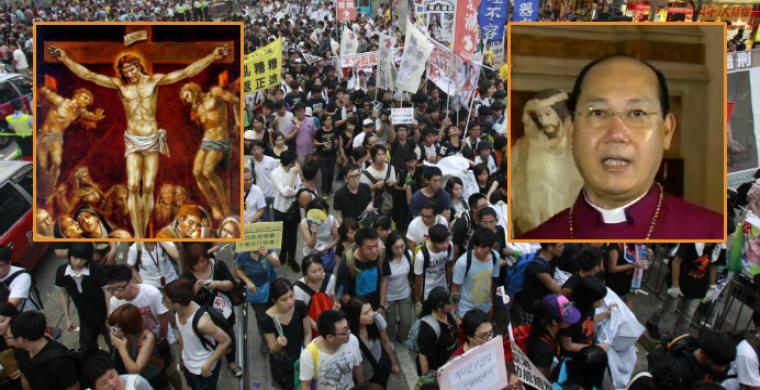Is Hong Kong's Anglican Church batting for the establishment?
By SC Yeung
http://www.ejinsight.com/
July 8, 2014
Should public order and social harmony take precedence over the fight for democratic freedoms?
Dr. Paul Kwong, the archbishop of the Anglican Church in Hong Kong, certainly seems to think so. The religious leader has stirred a debate as he poured cold water on the Occupy Central movement and the massive July 1 pro-democracy rally, deeming them as unnecessary.
In a sermon at St Paul’s Church on Sunday, Kwong criticized the participants of July 1 march for displaying a “herd mentality” and not thinking independently as they joined a call to send a message to the government about perceived injustices. Also, he didn’t have any kind words to say about the student activists arrested during a sit-in on July 2 in the Central district.
Hong Kong is still a good place although some issues have emerged recently, Kwong said. People shouldn’t rush out into the streets even if they want to make some point, he said, noting that Jesus Christ kept silent even when his life was under threat.
The church leader said there is no use calling for full autonomy, pointing out that Hong Kong has never had full autonomy, only high degree of autonomy.
The comments led critics to say that Kwong is using his capacity as a religious leader to please the authorities and utilize the church as a tool to bring harmony to society, rather than stand upfront to fight injustice and an unfair political system. The church is striking a pro-establishment stance to support the government rule, regardless of whether the current policies are fair or not, they say.
Kwong is one of the key voices that spoke out against the Occupy Central movement after more than half a million people took to the streets on July 1 to demand universal suffrage in the 2017 chief executive election.
While some church goers may accept the viewpoint of Kwong, there are many others who do not agree with his stance. Critics say there was no benevolence, forgiveness or kindness in his speech, and that his comments were also unfair to the Anglican Church members who stood up in the fight for true democracy in Hong Kong.
Religious leaders should show mercy and love to those arrested during the occupation campaign, rather than insult them in a sermon, activists say, accusing Kwong of losing his way in dealing with public affairs.
Prior to Hong Kong’s handover to Chinese rule, the Anglican Church had been willing to speak out against injustices. It had publicly expressed its dismay at the June 4 Tiananmen Massacre in 1989, with clergymen wearing black at that time in dissent. Peter Kwong, who was then the bishop of the Hong Kong Anglican Church, had resigned from the Basic Law Committee in a show of protest.
But the bravery seems to have disappeared after the 1997 handover. The church is now adopting a very conservative stance on public affairs and concentrating on social welfare and education.
As the church wants authorities to push welfare services, it is avoiding touching sensitive political issues and generally taking a pro-establishment line. The approach helped Kwong become a member of the Chinese People’s Political Consultative Conference in 2013.
The recent developments show that the Anglican Church has lagged behind the Catholic Church in Hong Kong in urging political reforms and heeding the calls of concerned groups on issues such as the northeast New Territories development plan.
The Catholic Church has adopted a much more progressive view in pushing forward a democratic electoral system in Hong Kong, with Cardinal Joseph Zen playing an active role. Zen undertook a week-long walking tour last month to urge Hong Kong people to participate in an unofficial referendum on electoral reforms.
“Universal suffrage is not a cure-all medicine,” Kwong said in an interview published in Echo, the official weekly newspaper published by the Anglican Church in Hong Kong, last year.
His conservative view on political reform suggests that the church intends to keep a low profile and following Beijing’s direction to stay silent over the electoral system, rather than fight for an opportunity to change it.
END














